69新概念英语第二册69课
- 格式:pptx
- 大小:137.99 KB
- 文档页数:22

新概念第⼆册课堂笔记Lesson69Lesson 69 But not murder!【语法Grammar in use】被动语态(1)被动语态的基本形式:Recently it was damaged by a visitor.最近它被⼀个客⼈弄坏了。
(⼀般过去时)Passing planes can be heard night and day.过往飞机⽇夜不绝于⽿。
(与情态助动词连⽤)Over a hundred people must have been driven away from their homes by the noise.有⼀百多⼈肯定是被噪⾳逼得已经弃家远去。
(must与被动语态的完成式连⽤)The bicycle was being sent to his home by train.⼈们正⽤⽕车给他把⾃⾏车送回家。
(被动语态⽤于过去进⾏时)He never expected the thief to be arrested.他从未指望那⼩偷能被逮着。
(被动语态⽤于复合宾语中的不定式结构中)The whole village soon learnt that a large sum of money had been lost.整个村⼦很快知道,有⼀⼤笔钱丢失了。
(⽤于过去完成时)(2)被动语态还可以⽤于介词+动名词结构中。
介词(after, before, on)+动名词这个结构通常相当于⼀个时间状语从句。
如果两个动作中有⼀个在另⼀个开始之前已经完成,则可以⽤after+动名词的完成式表⽰第1个动作;如果只表⽰先后顺序,则可⽤after(或before)+动名词结构;on+动名词通常表⽰两个动作⼏乎同时发⽣:After having been instructed to drive out of town, I began to acquire confidence.在接到把车开出城的指令后,我开始有了信⼼。
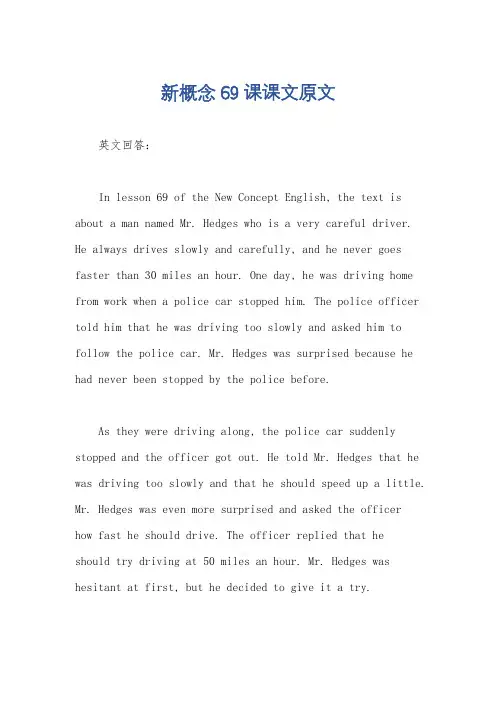
新概念69课课文原文英文回答:In lesson 69 of the New Concept English, the text is about a man named Mr. Hedges who is a very careful driver. He always drives slowly and carefully, and he never goes faster than 30 miles an hour. One day, he was driving home from work when a police car stopped him. The police officer told him that he was driving too slowly and asked him to follow the police car. Mr. Hedges was surprised because he had never been stopped by the police before.As they were driving along, the police car suddenly stopped and the officer got out. He told Mr. Hedges that he was driving too slowly and that he should speed up a little. Mr. Hedges was even more surprised and asked the officer how fast he should drive. The officer replied that heshould try driving at 50 miles an hour. Mr. Hedges was hesitant at first, but he decided to give it a try.After driving at 50 miles an hour for a while, Mr. Hedges felt more comfortable and realized that he had been driving too slowly all this time. He thanked the police officer for stopping him and giving him some advice. From that day on, Mr. Hedges became a more confident driver and was no longer afraid to drive faster when necessary.中文回答:在新概念英语第69课中,文章讲述了一个叫做赫奇斯先生的人,他是一个非常谨慎的司机。
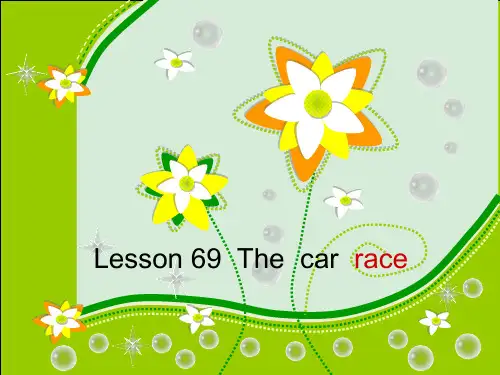
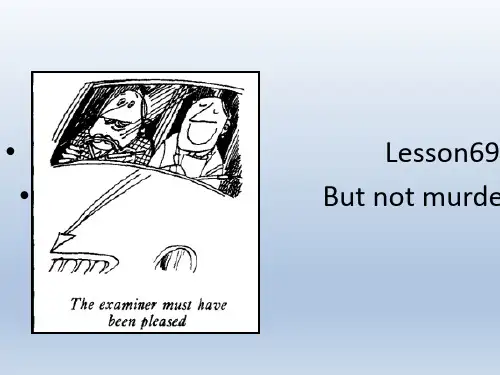

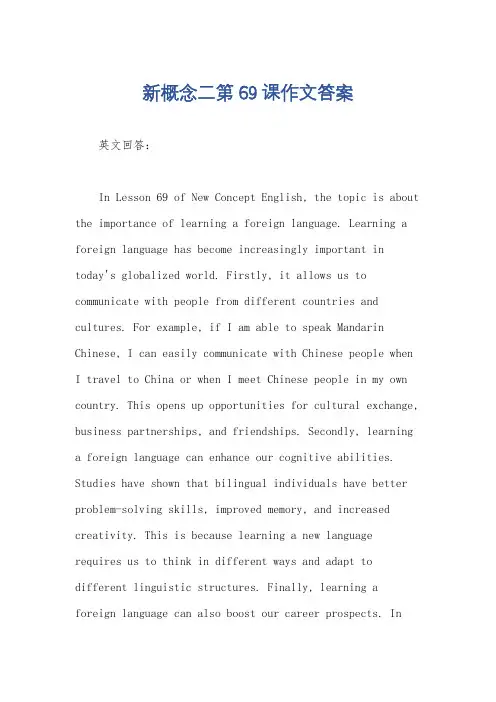
新概念二第69课作文答案英文回答:In Lesson 69 of New Concept English, the topic is about the importance of learning a foreign language. Learning a foreign language has become increasingly important intoday's globalized world. Firstly, it allows us to communicate with people from different countries and cultures. For example, if I am able to speak Mandarin Chinese, I can easily communicate with Chinese people when I travel to China or when I meet Chinese people in my own country. This opens up opportunities for cultural exchange, business partnerships, and friendships. Secondly, learning a foreign language can enhance our cognitive abilities. Studies have shown that bilingual individuals have better problem-solving skills, improved memory, and increased creativity. This is because learning a new language requires us to think in different ways and adapt to different linguistic structures. Finally, learning a foreign language can also boost our career prospects. Intoday's global job market, employers often value candidates who can speak multiple languages. Being bilingual or multilingual can give us a competitive edge and increase our chances of getting hired for international positions or assignments.中文回答:在《新概念英语》第69课中,讨论了学习外语的重要性。

新概念英语第二册69课练习题被动语态练习题1. It is said that a new robot ____by him in a few days.A. designedB. has been designedC. will be designedD. will have been designed2. She will stop showing off if no notice____ of her.A. is takenB. takesC. will be takenD. has taken3. My pictures ____until next Friday.A. won't developB. aren't developedC. don't developD. won' t be developed4. Tim ____since he lost his job three weeks ago.A. had been unemployedB. was unemployedC. has been unemployedD. has unemployed5. A great number of colleges and universities ____since 1949.A. has been establishB. have been establishedC. have establishedD. had been established6. I'll have to push the car to the side of the road because we ____if we leave it here.A. would be finedB. will be finedC. will being finedD. will have been fined7.“____two tickets for the new play at the Grand Theatre on Saturday. Shall we go and see it together?”A. They have been givenB. I have been givenC. I am givenD. They have given to me8. The goods ____when we arrived at the airport.A. were just unloadingB. were just been unloadingC. had just unloadedD. were just being unloaded9. I think much attention ____your pronunciation.A. must be paid toB. ought to be paid toC. must pay toD. should be paid to10. I don't remember ____the chance to try this method.A. having been givenB. to have been givenC. having givenD. to have given11.We could ask someone to do the work privately without it____.A. knowB. be knownC. being knownD. to be known12. The construction of the laboratory ____by the end of next month.A. must be completedB. must have been completedC. will be completingD. will have been completing13. He does not possess a bicycle, this one he uses ____to Peter.A. is belonged toB. belongedC. belongsD. is belonging14. The reason for all the changes being made ____to us yet.A. has not explainedB. has not been explainedC. did not explainedD. were not explained15. When he turned the corner, he found himself ____by a man in black.A. tailedB. been tailedC. was tailedD. had been tailed16. A candidate for the democratic presidential nomination ____at this moment.A. is interviewingB. being interviewedC. is being interviewedD. interviewing17. As we approached the work site, the workers were seen ____the new house.A. buildingB. buildC. builtD. to build18. He ordered that the books _______at once.A . would be printedB . would printC . be printedD . print19. He _______by his teacher.A. happened to seeB. was happened to seeC. happened to be seenD.was happened to be seen20. If city noises ____ from increasing,people ____ shout to be heard even at dinner.A. are not kept; will have toB. are not kept;haveC. do not keep;will have to D . do not keep;have to21. This page needed ___ again.A .being checkedB .checkedC . to check D. to be checked。
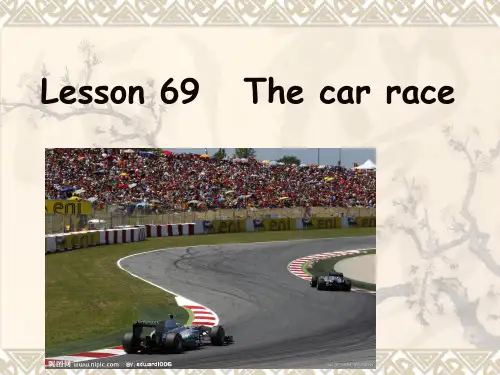
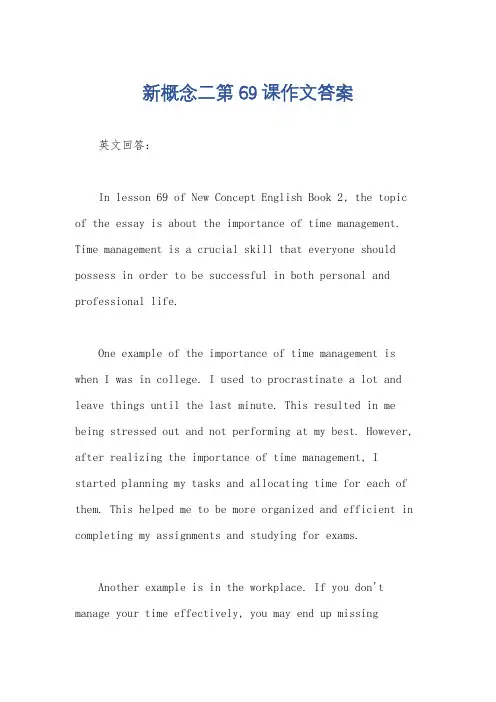
新概念二第69课作文答案英文回答:In lesson 69 of New Concept English Book 2, the topic of the essay is about the importance of time management. Time management is a crucial skill that everyone should possess in order to be successful in both personal and professional life.One example of the importance of time management is when I was in college. I used to procrastinate a lot and leave things until the last minute. This resulted in me being stressed out and not performing at my best. However, after realizing the importance of time management, I started planning my tasks and allocating time for each of them. This helped me to be more organized and efficient in completing my assignments and studying for exams.Another example is in the workplace. If you don't manage your time effectively, you may end up missingdeadlines, which can have negative consequences on your career. By prioritizing tasks and setting deadlines foreach of them, you can ensure that you are meeting yourgoals and delivering quality work on time.Overall, time management is a skill that can greatly impact your success and well-being. It allows you to makethe most out of your day and achieve your goals efficiently.中文回答:在新概念英语第二册第69课中,文章的主题是关于时间管理的重要性。
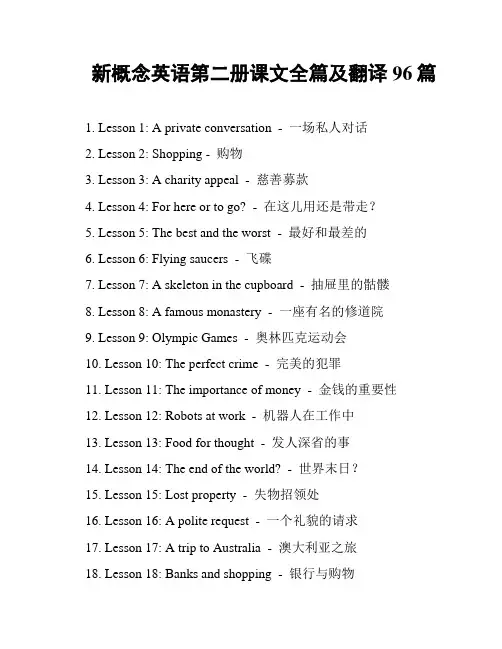
新概念英语第二册课文全篇及翻译96篇1. Lesson 1: A private conversation - 一场私人对话2. Lesson 2: Shopping - 购物3. Lesson 3: A charity appeal - 慈善募款4. Lesson 4: For here or to go? - 在这儿用还是带走?5. Lesson 5: The best and the worst - 最好和最差的6. Lesson 6: Flying saucers - 飞碟7. Lesson 7: A skeleton in the cupboard - 抽屉里的骷髅8. Lesson 8: A famous monastery - 一座有名的修道院9. Lesson 9: Olympic Games - 奥林匹克运动会10. Lesson 10: The perfect crime - 完美的犯罪11. Lesson 11: The importance of money - 金钱的重要性12. Lesson 12: Robots at work - 机器人在工作中13. Lesson 13: Food for thought - 发人深省的事14. Lesson 14: The end of the world? - 世界末日?15. Lesson 15: Lost property - 失物招领处16. Lesson 16: A polite request - 一个礼貌的请求17. Lesson 17: A trip to Australia - 澳大利亚之旅18. Lesson 18: Banks and shopping - 银行与购物19. Lesson 19: There's no smoke without fire - 无风不起浪20. Lesson 20: Long distance love - 远距离恋爱21. Lesson 21: A new house - 一所新房子22. Lesson 22: Nothing is impossible - 没有什么是不可能的23. Lesson 23: The Women's Institute - 妇女协会24. Lesson 24: The way to be happy - 幸福之道25. Lesson 25: China's treasures - 中国的宝藏26. Lesson 26: America's National Parks - 美国的国家公园27. Lesson 27: The benefits of laughter - 笑的好处28. Lesson 28: Travel - 旅行29. Lesson 29: Growing plants indoors - 室内种植植物30. Lesson 30: Tom's hobby - 汤姆的爱好31. Lesson 31: The invention of penicillin - 青霉素的发明32. Lesson 32: The Loch Ness Monster - 尼斯湖水怪33. Lesson 33: How to stop smoking - 如何戒烟34. Lesson 34: The Channel Tunnel - 海峡隧道35. Lesson 35: Memories - 回忆36. Lesson 36: The history of the Olympics - 奥运会的历史37. Lesson 37: Chance and opportunity - 机会与机遇38. Lesson 38: An unusual school - 一所不寻常的学校39. Lesson 39: Telepathy - 心灵感应40. Lesson 40: Motoring - 汽车运动41. Lesson 41: The Bank of English - 英语银行42. Lesson 42: Thw wind of change - 变革的风43. Lesson 43: My dream - 我的梦想44. Lesson 44: Secrets of the mind - 心灵的秘密45. Lesson 45: The Wadden Sea - 瓦登海46. Lesson 46: A trip into space - 太空之旅47. Lesson 47: Going into hospital - 进医院48. Lesson 48: Daredevils - 蛮勇的人49. Lesson 49: A new breed of car - 新一代的汽车50. Lesson 50: Arabian hospitality - 阿拉伯的好客51. Lesson 51: Peaceful uses of atomic energy - 和平利用原子能52. Lesson 52: A birthday present - 一份生日礼物53. Lesson 53: The coast of East Anglia - 东安格利亚海岸54. Lesson 54: Looking for a job - 找工作55. Lesson 55: Studying abroad - 出国留学56. Lesson 56: Poles apart - 截然不同57. Lesson 57: The story of silk - 丝的故事59. Lesson 59: Art and artists - 艺术和艺术家60. Lesson 60: Keeping the doctor away - 远离医生61. Lesson 61: The European Parliament - 欧洲议会62. Lesson 62: The early days of aviation - 航空的早期日子63. Lesson 63: Sleep and health - 睡眠与健康64. Lesson 64: Beyond the Milky Way - 银河系之外65. Lesson 65: Settling down - 定居下来66. Lesson 66: Astronomical discoveries - 天文学的发现67. Lesson 67: Curiosity - 好奇心68. Lesson 68: Making an emergency landing - 进行紧急降落69. Lesson 69: Power for the future - 未来的动力70. Lesson 70: The Bald Piano Player - 秃头钢琴家71. Lesson 71: A difficult customer - 一个难对付的顾客72. Lesson 72: The Olympic Games - 奥林匹克运动会73. Lesson 73: The world's worst singer - 世界上最糟糕的歌手74. Lesson 74: Just a holiday - 只是一次假期75. Lesson 75: Home sweet home - 甜蜜的家76. Lesson 76: A famous clock - 一个著名的时钟77. Lesson 77: False money - 假币78. Lesson 78: The United Nations - 联合国79. Lesson 79: Changing attitudes - 态度的转变80. Lesson 80: Cultural exchanges - 文化交流82. Lesson 82: Television and radio - 电视和广播83. Lesson 83: Marriage - 婚姻85. Lesson 85: Danger - men at work - 危险 - 男人在工作86. Lesson 86: Saving electricity - 节约用电87. Lesson 87: A close shave - 惊险时刻88. Lesson 88: Music - the universal language - 音乐 - 普遍的语言89. Lesson 89: Space pioneers - 太空先驱者90. Lesson 90: House-warming - 乔迁之喜91. Lesson 91: Toys - 玩具92. Lesson 92: Dear George - 亲爱的乔治93. Lesson 93: Growing old - 变老94. Lesson 94: What's in a name? - 名字有什么重要?95. Lesson 95: The dance of the hens - 鸡的舞蹈96. Lesson 96: A pretty carpet - 一块漂亮的地毯。
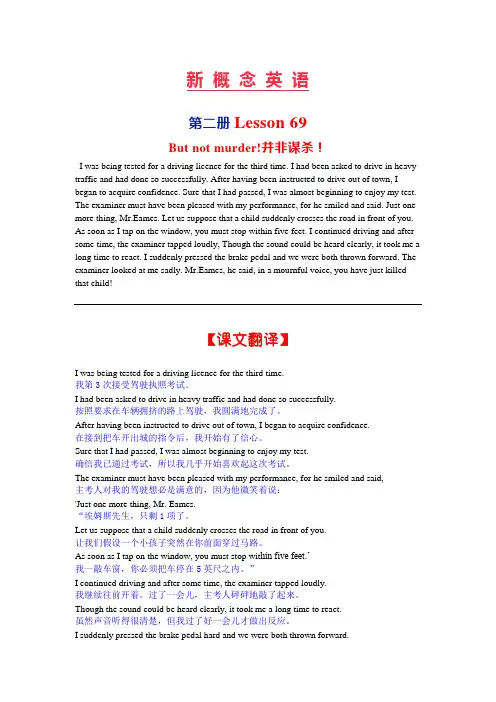
新概念英语第二册Lesson 69But not murder!并非谋杀!I was being tested for a driving licence for the third time. I had been asked to drive in heavy traffic and had done so successfully. After having been instructed to drive out of town, I began to acquire confidence. Sure that I had passed, I was almost beginning to enjoy my test. The examiner must have been pleased with my performance, for he smiled and said. Just one more thing, Mr.Eames. Let us suppose that a child suddenly crosses the road in front of you. As soon as I tap on the window, you must stop within five feet. I continued driving and after some time, the examiner tapped loudly, Though the sound could be heard clearly, it took me a long time to react. I suddenly pressed the brake pedal and we were both thrown forward. The examiner looked at me sadly. Mr.Eames, he said, in a mournful voice, you have just killed that child!【课文翻译】I was being tested for a driving licence for the third time.我第3次接受驾驶执照考试。
Lesson 69 But not murder!【语法Grammar in use】被动语态(1)被动语态的基本形式:Recently it was damaged by a visitor.最近它被一个客人弄坏了。
(一般过去时)Passing planes can be heard night and day.过往飞机日夜不绝于耳。
(与情态助动词连用)Over a hundred people must have been driven away from their homes by the noise.有一百多人肯定是被噪音逼得已经弃家远去。
(must与被动语态的完成式连用)The bicycle was being sent to his home by train.人们正用火车给他把自行车送回家。
(被动语态用于过去进行时)He never expected the thief to be arrested.他从未指望那小偷能被逮着。
(被动语态用于复合宾语中的不定式结构中)The whole village soon learnt that a large sum of money had been lost.整个村子很快知道,有一大笔钱丢失了。
(用于过去完成时)(2)被动语态还可以用于介词+动名词结构中。
介词(after, before, on)+动名词这个结构通常相当于一个时间状语从句。
如果两个动作中有一个在另一个开始之前已经完成,则可以用after+动名词的完成式表示第1个动作;如果只表示先后顺序,则可用after(或before)+动名词结构;on+动名词通常表示两个动作几乎同时发生:After having been instructed to drive out of town, I began to acquire confidence.在接到把车开出城的指令后,我开始有了信心。
【导语】新概念英语作为⼀套世界闻名的英语教程,以其全新的教学理念,有趣的课⽂内容和全⾯的技能训练,深受⼴⼤英语学习者的欢迎和喜爱。
为了⽅便同学们的学习,为⼤家整理了⾯的新概念第⼆册课⽂翻译及学习笔记,希望为⼤家的新概念英语学习提供帮助!《新概念英语》第⼆册第67课:Volcanoes【课⽂】Haroun Tazieff, the Polish scientist, has spent his lifetime studying active volcanoes and deep caves in all parts of the world. In 1948, he went to Lake Kivu in the Congo to observe a new volcano which he later named Kituro. Tazieff was able to set up his camp very close to the volcano while it was erupting violently. Though he managed to take a number of brilliant photographs, he could not stay near the volcano for very long. He noticed that a river of liquid rock was coming towards him. It threatened to surround him completely, but Tazieff managed to escape just in time. He waited until the volcano became quiet and he was able to return two days later. This time, he managed to climb into the mouth of Kituro so that he could take photographs and measure temperatures. Tazieff has often risked his life in this way. He has been able to tell us more about active volcanoes than any man alive.【课⽂翻译】波兰科学家哈罗恩·塔捷耶夫花了毕⽣的精⼒来研究世界各地的活⽕⼭和深洞. 1948年他去了刚果的基伍湖, 对⼀座后来被他命名为基图罗的新⽕⼭进⾏观察. 当⽕⼭正在猛烈地喷发时, 塔捷耶夫有办法把帐篷搭在离它⾮常近的地⽅. 尽管他设法拍了⼀些⼗分精彩的照⽚, 但他却不能在⽕⼭附近停留太长的时间. 他发现有⼀股岩浆正向他流过来, 眼看就要将他团团围住, 但塔捷耶夫还是设法及时逃离了. 他等到⽕⼭平静下来, 两天以后⼜返回去. 这次他设法爬进了基图罗⽕⼭⼝, 以便能拍摄照⽚和测试温度. 塔捷耶夫经常冒这样的⽣命危险. 他能告诉我们的有关活⽕⼭的情况⽐任何在世的⼈都要多.【⽣词汇总】volcano n. ⽕⼭active adj. 活动的Kivu n. 基伍湖Congo n. 刚果Kituro n. 基图罗erupt v. (⽕⼭)喷发violently adv. 猛烈地,剧烈地manage v. 设法brilliant adj. 精彩的liquid [5likwid] adj. 液态的;n. 液体escape v. 逃脱alive adj. 活着的【短语汇总】set up建⽴manage to do设法做某事【知识点讲解】1,manage to do指的是设法办成了某事,侧重于结果,强调办成了,这就是他和try to do 的区别2,close to 离……很近,与……靠近He parked the car close to the river.Don’t sit so close to the fire.3,risk⽤法汇总risk one’s life 冒着⽣命危险take a risk of… =at a risk of… 冒着……的危险risk sth.=risk losing sth. 冒着失去……的危险risk doing sth. 冒着做……的危险《新概念英语》第⼆册第68课:persistent【课⽂】I crossed the street to avoid meeting him, but he saw me and came running towards me. It was no use pretending that I had not seen him, so I waved to him. I never enjoy meeting Nigel Dykes. He never has anything to do. No matter how busy you are, he always insists on coming with you. I had to think of a way of preventing him from following me around all morning.'Hello, Nigel,' I said. 'Fancy meeting you here!''Hi, Elizabeth,' Nigel answered. 'I was just wondering how to spend the morning -- until I saw you. You're not busy doing anything, are you?''No, not at all,' I answered. 'I'm going to...''Would you mind my coming with you?' he asked, before I had finished speaking.'Not at all,' I lied, 'but I'm going to the dentist.''Then I'll come with you,' he answered. 'There's always plenty to read in the waiting room!’【课⽂翻译】我穿过马路以便避开他, 但他看到我并朝我跑过来. 若再装作没看见他已是没有⽤了, 我只好向他招⼿。
But not murder!并非谋杀!新概念英语第二册自学导读笔记第69课新概念英语第二册第69课课文重难点 further notes on the text1.to drive in heavy traffic, 在车辆拥挤的路上驾驶。
heavy在这里表示"大量的"、"多的"、"密集的":traffic is heavier on this road than on the other one.这条路上的交通比另一条路上拥挤。
2.…i began to acquire confidence.……我开始有了信心。
acquire通常表示通过努力"获得"、"学到(知识、技术、语言等)",也可用来表示"养成(习惯等)":mary acquired a good knowledge of chinese in five years' time.5年之内玛丽学会了汉语。
tom acquired a habit of smoking.汤姆养成了抽烟的习惯。
3.sure that i had passed…确信我已通过考试……句首省略了分词being或feeling,在句中作状语(与分词结构作状语的情况类似):interested in the story, he finished reading the book in two hours.因为对故事(情节)感兴趣,他两个小时就把那本书读完了。
4.the examiner must have been pleased with my performance…主考人对我的驾驶想必是满意的……must have been表示对过去的事情实行猜测。
performance在这里表示"表现"、"表演"、"工作情况"等。